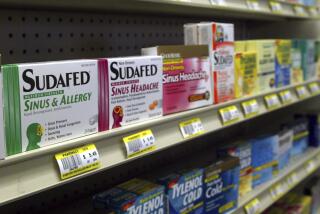Allergy Medications With Side Effects
- Share via
With the hay fever season upon us, millions of allergy sufferers are grabbing over-the-counter remedies to ease their sniffles, sneezes and nasal congestion. But these seemingly innocuous drugs can have unexpected consequences, especially for the elderly and those with chronic illnesses.
“Several of these products have significant side effects,” said Dr. Paul H. Ratner, co-author of an article on allergy and cold drugs that appeared in this month’s issue of Mayo Clinic Proceedings, the journal of the Mayo Clinic in Rochester, Minn. “They can also counteract the effects of other medications.”
Experts are most concerned about the adverse effects of antihistamines--which control such allergy symptoms as sneezing, itching and runny nose--and pseudoephedrine, the active ingredient in most decongestant cold medications.
Antihistamines often make people feel sleepy--which isn’t a problem if you’re ready for bed but can be dangerous if you’re behind the wheel.
A 2000 University of Iowa study, which used a simulator to test participants’ responses, found that the driving performance of people who had taken the antihistamine diphenhydramine (the active ingredient in Benadryl) was even poorer then those who were legally drunk.
In addition, these medications dry up not only mucous membranes but also other bodily fluids, which can create bladder and prostate problems in people such as the elderly who already have difficulty with urination.
Pseudoephedrine (found in popular decongestants such as Dristan or Actifed Cold & Sinus), on the other hand, can cause insomnia, hyperactivity in children and irregular heartbeats (phenylpropanolamine and phenylephrine, two other decongestants, have similar effects).
The drug narrows blood vessels, which helps clear nasal congestion, but can spike blood pressure in people with hypertension. It can also interfere with the effects of sleeping pills or blood pressure medication.
“Allergies are not a trivial problem,” says Dr. Michael Schatz, chief of the department of allergy at Kaiser Permanente Medical Center in San Diego.
“People should consult with their doctors, who can prescribe medications that are more effective with fewer side effects.”
If you can’t see your physician, however, at least ask a pharmacist about possible adverse reactions.
“OTC drugs aren’t like candy you can just pick up at the convenience store,” says Jeffery A. Goad, an assistant professor of clinical pharmacy at the USC School of Pharmacy.
“They’re still potent medications.”





